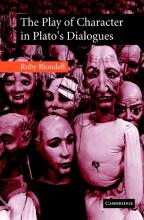Despite the recent explosion of interest in alternative ways of reading Plato, a gulf still exists between "literary" and "philosophical" interpretions. This book attempts to bridge that division by focussing on Plato's use of characterization, which is both intrinsic to the "literary" questions raised by his use of dramatic form, and fundamental to his "philosophical" concern with moral character. Form and content are also reciprocally related through Plato’s preoccupation with literary characterization on the discursive level. Two opening chapters examine the methodological issues involved in reading Plato "as drama," and other preliminary matters, including ancient Greek conceptions of "character," the figure of Sokrates qua "dramatic" hero, and the influence of literary characters on an audience. The rest of the book offers close readings of select dialogues, chosen to show the wide range of ways in which Plato uses his characters, with special attention to the kaleidoscopic figure of Sokrates.
For further details please visit the Cambridge University Press website here.
